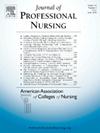专科护士与专科护士学术合作认知及其影响因素:一项基于区域护理学会的调查
IF 2.9
3区 医学
Q1 NURSING
引用次数: 0
摘要
拥有以研究和实践为重点的博士学位的护士相互补充,为护理职业的发展做出贡献。了解感知学术合作及其影响因素可以促进有效的团队合作,有利于护理专业,改善患者预后。目的探讨博士及在读护士对学术合作的认知及其影响因素。方法采用描述性横断面设计,采用方便抽样法对181名博士预备护士进行调查。参与者是从美国南部的一个护理协会招募的,并完成了一项在线调查。结果以研究为中心的护士报告的合作率高于以实践为中心的护士(73.5%对63.8%)。年轻的年龄和早期的职业生涯阶段与较少的学术合作,以实践为重点的护士。确定了五个主题来改善博士- dnp的学术合作:联系;澄清;教育、培训和交流;指导;以及资金支持。结论研究结果强调了在制定促进学术合作策略时考虑年龄和职业轨迹的重要性。需要更多的研究来确定解决方案(例如建立联系、澄清角色模糊和提供指导),以促进博士- dnp的学术合作。本文章由计算机程序翻译,如有差异,请以英文原文为准。
Perception of scholarly collaboration and its influencing factors among doctoral-prepared and -preparing nurses: A regional nursing society-based survey
Background
Nurses with research- and practice-focused doctorate degrees complement each other's work and contribute to the advancement of nursing profession. Understanding perceived scholarly collaboration and its influencing factors can facilitate effective teamwork, benefit the nursing profession, and improve patient outcomes.
Purpose
This study aimed to investigate the perceived scholarly collaboration and its influencing factors among nurses with or pursing doctoral degrees.
Methods
Using a descriptive cross-sectional design, 181 doctoral-prepared and -preparing nurses were recruited using a convenient sampling method. Participants were recruited from a nursing society-based region in the Southern United States and completed an online survey.
Results
Research-focused nurses reported a higher rate of collaboration than practice-focused nurses (73.5 % versus 63.8 %). Young age and early career stage were associated with less scholarly collaboration among practice-focused nurses. Five themes were identified to improve PhD-DNP scholarly collaboration: connections; clarification; education, training, and communication; mentorship; and funding support.
Conclusion
The results highlight the importance of considering age and career trajectory when devising strategies to enhance scholarly collaboration. More studies are needed to identify solutions (e.g. building connections, clarifying role ambiguities, and providing mentorship) to promote PhD-DNP scholarly collaboration.
求助全文
通过发布文献求助,成功后即可免费获取论文全文。
去求助
来源期刊
CiteScore
4.80
自引率
8.00%
发文量
153
审稿时长
52 days
期刊介绍:
The Journal will accept articles that focus on baccalaureate and higher degree nursing education, educational research, policy related to education, and education and practice partnerships. Reports of original work, research, reviews, insightful descriptions, and policy papers focusing on baccalaureate and graduate nursing education will be published.

 求助内容:
求助内容: 应助结果提醒方式:
应助结果提醒方式:


